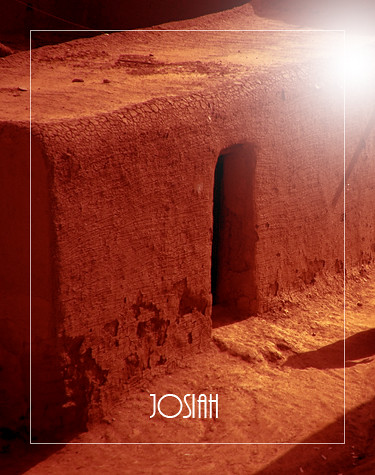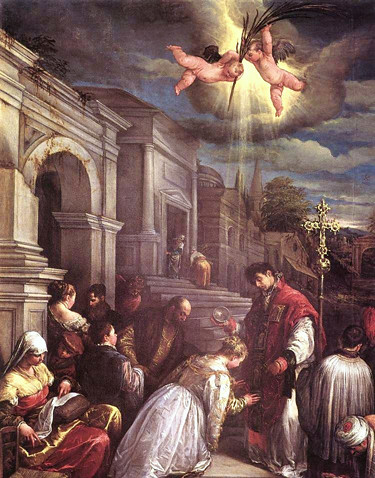
Volume XIV, Issue VII
Josiah
By Bob Kirchman
Copyright © 2018, The Kirchman Studio, all rights reserved
Chapter 7: Generations
Having quite likely spared the colonists the agony of the Pilgrims’ first year, Josiah and Allison divided the greenhouses into plots. They encouraged the building of mud houses on one’s own section and the mere expediency of being on the land gave each settler a sense of purpose when he or she awoke in the morning. There even developed a bit of healthy competition in keeping one’s rows straighter than that of her neighbor. The result was, of course, a better yield than the original collective method might have produced.
The artisans who ran machines that wove cloth, the repairers of pressure suits, the makers of fired pottery and plates all collected in houses close to one another and although this was to have been a cashless society, a simple accounting and currency system emerged nonetheless. Eventually a little cookhouse developed into a tavern. The owners fermented a bit of grain for ‘personal use’ at first but as the years passed, they made enough to share and then sell. Their skill in preparing food did not go unnoticed and soon they were a regular stop for the settlers. There much discussion and business would be transacted.
There were no movies. There was no radio. All of the really high technology had been destroyed in the explosion, but somehow the noisy engines of agriculture and production had been relegated to the fringe… and that is why they survived. Evenings were quiet and the settlers eventually produced children. Although APOLLONIUS was originally planning to raise them in collective nurseries, the simple life of the settlers made it more logical for small family groups to raise their own children. In the decades that followed, those children had children. That is why the colony now had 122 souls. Obviously that part of colonization worked pretty much as planned.
As the years passed, youthful Josiah found his hair tinged with grey. He now watched grandchildren play in the yard of the much enlarged mud house. He vaguely remembered a phenomenon that someone in the Zimmerman Organization had referred to as ‘White Dog Thinking.’ It seems that in his younger days, Zimmerman had known a couple who were so convinced that the world was so awful that they decided to have no children. Instead, they lavished their affections on a series of large white dogs. The colonists, for their part, were so steeped in the mindset that they needed to be fruitful that as bad as things seemed, they never succumbed to ‘White Dog Thinking.’ Surely another ship would come and the colony would go on. The world they had left was really a bad place, they reasoned. It was only a matter of time until Mars became what APOLLONIUS had envisioned – a new home and hope for humanity!
(to be continued)
Stones of Remembrance
Remembering G-d's Mighty Works in Our Lives

Angus Dei (Lamb of G-d), by Kristina Elaine Greer. [1.]
One of the greatest challenges to our Faith is our forgetfulness. Pastor Seth Hankee preached our sermon one Sunday about how the people were instructed to remember the great things G-d had done for them. G-d separated the Jordan, as He had the Red Sea, for the people to walk across and gave them the following command:
And it came to pass, when all the people were clean passed over Jordan, that the Lord spake unto Joshua, saying, Take you twelve men out of the people, out of every tribe a man, And command ye them, saying, Take you hence out of the midst of Jordan, out of the place where the priests' feet stood firm, twelve stones, and ye shall carry them over with you, and leave them in the lodging place, where ye shall lodge this night.
Then Joshua called the twelve men, whom he had prepared of the children of Israel, out of every tribe a man: And Joshua said unto them, Pass over before the ark of the Lord your G-d into the midst of Jordan, and take you up every man of you a stone upon his shoulder, according unto the number of the tribes of the children of Israel: That this may be a sign among you, that when your children ask their fathers in time to come, saying, What mean ye by these stones?
Then ye shall answer them, That the waters of Jordan were cut off before the ark of the covenant of the Lord; when it passed over Jordan, the waters of Jordan were cut off: and these stones shall be for a memorial unto the children of Israel for ever. And the children of Israel did so as Joshua commanded, and took up twelve stones out of the midst of Jordan, as the Lord spake unto Joshua, according to the number of the tribes of the children of Israel, and carried them over with them unto the place where they lodged, and laid them down there.
And Joshua set up twelve stones in the midst of Jordan, in the place where the feet of the priests which bare the ark of the covenant stood: and they are there unto this day." -- Joshua 4:1-9
The Passover meal had already been instituted as testimony to G-d's redemption, so that a child would ask: "Why is this Night Different from all Other Nights?" The story in a meal gave illustration to the miracle that had carried the people out of Egypt.
For the Christian, remembering deliverance from sin is the greatest miracle. In preparation for Easter, the Church observes Lent, reminding us of the deliverance Jesus brought us by way of the cross:
Ash Wednesday emphasizes two themes: our sinfulness before G-d and our human mortality. The service focuses on both themes, helping us to realize that both have been triumphed through the death and resurrection of Jesus Christ.
During some Ash Wednesday services, the minister will lightly rub the sign of the cross with ashes onto the foreheads of worshipers. The use of ashes as a sign of mortality and repentance has a long history in Jewish and Christian worship. Historically, ashes signified purification and sorrow for sins."-- —Adapted from The United Methodist Book of Worship
So it is very important to tell our stories of redemption, using reminders that will stir our minds to recall times when we were vividly aware of the Divine reaching out to touch our lives. Pastor Seth showed us a little children's book he had saved from his first house... on closer examination you could see the tire print on the page, a reminder of how when a car careened into his living room, it had narrowly missed hitting his wife and young child. Certainly G-d had protected his young family and that little book now told a much bigger story!
So now it is time to commit ourselves to the telling of the great stories, the ones that end in redemption and deliverance from our present condition. The Book of Judges follows the Book of Joshua and gives a sober warning: "And Joshua the son of Nun, the servant of the Lord, died, being an hundred and ten years old.
And they buried him in the border of his inheritance in Timnathheres, in the mount of Ephraim, on the north side of the hill Gaash.
And also all that generation were gathered unto their fathers: and there arose another generation after them, which knew not the Lord, nor yet the works which he had done for Israel." -- Judges 2:8-10
The importance of stories and their redemptive narrative cannot be emphasized enough. Passing the torch must always be a priority in every generation.
1. "I did this with a sheet of 8.5"x11" computer paper some ashes from my fireplace and canola oil. I mixed up some of the oil and ashes similar to how they are mixed on Ash Wednesday and painted them on the paper in a cross then sprinkled the rest of the dry ashes on top. I then found one of the music compositions for "Agnus Dei," Latin for Lamb of G-d, on www.hymnary.org [click to read] and cut out strictly the music overlaying it and changing the opacity over the picture of my ash cross. Then I added the Latin words meaning, "Lamb of G-d, who takes away the sins of the world, have mercy upon us, grant us peace." This piece is to remind us that we are sinners made up of dust, but G-d loved us so much, he took mercy on us sending His son as a sacrificial lamb, to take away our sins. If we believe and accept his sacrifice we are granted this eternal peace and life with Him. May the Lord bless you all and lead you closer to Him during this season of Lent, looking forward to the promise of Easter. Amen." -- Kristina Elaine Greer
Ash Wednesday and Lent
A Time For Reflection and Redirection

Sunset in the Blue Ridge Mountains.
Guest Post by M. K. Hand
You might notice people walking around with cross-shaped smudges on their foreheads. There is no "mystical" attribute assigned to this practice. The ashes are a physical reminder of our need for repentance, and a symbol of the dependency of humans on G-d's mercy through Jesus Christ.
Why ashes? The Bible speaks of man returning to dust and ashes (from whence he came), and Job smeared himself with dust and ashes as a symbol of atonement. Also, in the Old Testament, animals were sacrificed to G-d for atonement, and they were burnt to ashes. When Jesus came as a living sacrifice, the Law was no longer applicable, and animal sacrifices were no longer needed for atonement. Jesus was the final sacrifice...He ushered us into a time of Grace through Faith, once and for all.
Lent, the season leading up to Easter, is a time of increased attention to charity (love), prayer, and fasting for Christians. It is a special time to reflect, repent and rejoice. It prepares our hearts to fully take in and celebrate the sacrifice, atonement, and grace made possible by Jesus' crucifixion, and the restoration of our relationship, broken by our sin, with the Father. Many people fast, give up something meaningful to them, or turn away from a sin that has taken hold of their life; fasting is also a way to identify with the sacrifice made by Jesus at Calvary. May this time leading up to Easter be a time of reflection, repentance, and rejoicing for you!
Therefore also now, saith the Lord, turn ye even to me with all your heart, and with fasting, and with weeping, and with mourning: And rend your heart, and not your garments, and turn unto the Lord your G-d: for he is gracious and merciful, slow to anger, and of great kindness, and repenteth him of the evil." ~ Joel 2:12-13
The Real Saint Valentine

Saint Valentine baptizing St. Lucilla, Jacopo Bassano, 1500s
Valentine or Valentinus, is a Christian martyr. The most common story is told that Valentine was a priest in third century in Rome. When Emperor Claudius II decided that single men made better soldiers than those with wives and families, he outlawed marriage for young men. Valentine, realizing the injustice of the decree, defied Claudius and continued to perform marriages for young lovers in secret. When Valentine’s actions were discovered, Claudius ordered that he be put to death in 270 AD. While in prison, Valentine is said to have sent the first “valentine,” a letter that he signed “From your Valentine.”
Sherando Lake Winter Scene
Photo by Bob Kirchman

Reflected trees by the spillway of Sherando Lake Dam.
